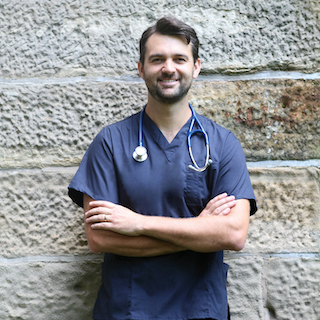Alumni in Focus Q&A with Dr Ben Bravery
Registrar at NSW Health. MBBS (Honours), 2019

Ben was a zoologist, then at 28, he was diagnosed with bowel cancer. He survived, became a doctor, and has now published his first book.
Why did you choose to study at Notre Dame?
I liked the way Notre Dame focused on the whole person. They don’t select students within the Medical School, they are selecting future doctors who will practice competently and ethically.
The best aspects of studying at Notre Dame were the quality of the educators, the small cohort which allowed a sense of community to develop, and the inclusion of ethics, philosophy, and social justice alongside medicine.
How did you overcome challenges in switching careers from Zoology to Medicine?
I decided to become a doctor while undergoing treatment for colorectal cancer at 28 years old. I thought it would be a good way to give back. I realised that one day I would die… I had a sense of my own mortality, and so I went to med school to learn why and what had happened to my body. I had also noticed that the health system makes it very hard to be flexible and is not always in the best interests of patients, and that to change healthcare I would have to enter it. I think I can make a difference. I still feel as motivated and passionate as I was when I knew I had another calling in life.
At thirty-two years old, I was older than the other students. I had also almost died, so I kind of ‘got it’ when it came to illness and patients. While studying, I was still a patient with a separate busy schedule of check-ups, scans and scopes.
What was your most memorable experience from your time at Notre Dame?
In my first year of medicine, we were organised into tutorial groups of eight students and allocated a tutor. Because medicine can be very isolating and demanding, these students and our tutor, a doctor, became close. We shared laughs and tears, all the while learning and guiding each other towards becoming the best doctors we could be.
You recently published a book ‘The Patient Doctor'. Why did you write this book and how do you hope it will improve current health systems?
Instead of running away from the health system after cancer treatment, I ran towards it, and re-trained as a doctor. As a patient I had often been frustrated with the health system, and as a doctor even more so. I realised patients and doctors were hurting, and so my mission to improve things got even bigger. My scans tell me there are no tumors now, but cancer changed me forever. I feel neither well nor unwell, not fully a doctor nor fully a patient. My book is about my place in these two worlds and the things I’ve learnt. My hope is to empower both patients and doctors, to better understand each other, and to demand a better kind of medicine
What are the greatest joys in a career in medicine?
Connecting with patients in their times of need and making something difficult they are facing that tiny bit more bearable.
How do you remain resilient in your line of work?
By protecting my humanity. I do this by reading, trying to eat healthily, exercising and spending time with people who make me happy, and remembering to put my phone away sometimes!
Favourite quote or mantra?
"Progress is impossible without change, and those who cannot change their minds cannot change anything". George Bernard Shaw
If you’d like to read more of Ben’s story, be sure to check out his new book ‘The Patient Doctor: How one man’s cancer diagnosis led to a quest to put the heart back into healthcare’.
Alumni in Focus is brought to you by the Advancement Unit. The views, opinions and positions expressed by the speakers and those providing comments are theirs alone, and do not necessarily reflect the views, opinions or positions of The University of Notre Dame or any employee thereof.

Connect with Notre Dame on Social Media
Australia
Fremantle
Broome
Sydney